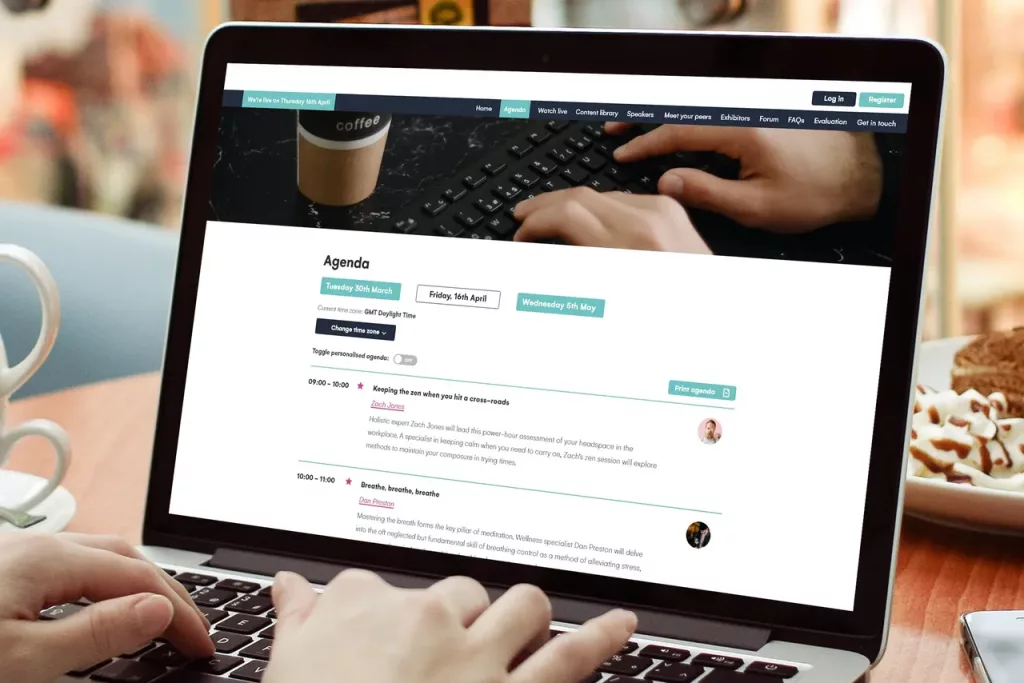28 May 2021|Crisis Management, Latest Posts, Marketing, PR, Promotion

By Toby Lewis, CEO at Live Group. COVID-19 has fundamentally changed the way that businesses and brands have been engaging with their audiences. Lockdown restrictions have increasingly turned marketing strategies digital – indeed, mobile ad spend alone in Q2 2020 had risen by 71% over Q2 2019.[1]However, few businesses have made full use of virtual events to increase meaningful engagement.
Companies can no longer afford to postpone activities whilst waiting for ‘normal’ life to resume. Instead, they should revolutionise their programmes to progress away from standard activities of webinars and roundtables. Virtual events are here to stay, and innovative new digital platforms are developing apace; businesses across sectors should be leveraging their potential now to jumpstart post-pandemic recovery.
Making up for missed opportunities
COVID-19 restrictions have meant that companies have lost out on a huge amount of networking opportunities. Large international events that have been the fulcrum of business engagement for many industries – such as the Paris Fintech Forum, which saw attendees from 75 countries in 2019 – were unable to host their activities, and as a result there has been a real difficulty in making meaningful in-person connections.
Some global conferences have turned to digital events to navigate this issue and have reaped the benefits of being able to offer relevant and data-driven content as well as efficient networking channels. Now, individual companies should be looking to gain the same advantages by using online platforms to host their own virtual events, driving meaningful engagement through content that is tailored to their audiences in creative new formats.
Reap the rewards of virtual engagement
Studies show that using event tech can increase attendance by 20% and increase productivity by 27%.[2] The capabilities of virtual activities can far surpass anything that is offered by a standard webinar; attendees can network through fun interactive tools, navigate the event in their own time and establish a unique relationship with the host business. When virtual events offer such opportunities, why should companies hold out for a return to traditional schedules? Harnessing online activities now can lay the groundwork for the type of engagement that offers long-term rewards.
In short, increased event attendance means increased business opportunities, and 52% of organizations running virtual events reported seeing the same or more attendance than they’d expect at an in-person event.[3] The effects of this can be felt far into the future; once the audience is logged in, digital platforms can gather a huge amount of insight that can inform marketing and engagement strategies in both the long- and short-term.
However, virtual events can also offer significant benefits to the consumer. By nature, online platforms navigate many of the logistical challenges that are presented by in-person events. Attendees can log in from their own homes in an environment that is comfortable to them, eliminating travel costs and ensuring that engagement is accessible, inclusive and sustainable.
This individual journey continues across the whole lifecycle of the event and translates into how the audience can engage with the platform outside of any live elements. A ‘peer hub’ can provide participants with personalised profiles and integrated search tools, which can identify relevant fellow delegates, sponsors or exhibitors for networking opportunities. Channels that navigate discussions around pre- and post-event material can generate a significant amount of audience driven content, aiding discovery and collaboration.
Companies across sectors should be prioritising these goals in all elements of their business models to ensure long-term success, and virtual events can be the first stepping-stone.

Overlooked strengths
Many businesses have understandably focussed their attention towards online content in the last year. This has meant that channels are now saturated with digital marketing – 96% of B2B marketers use LinkedIn for content marketing and 83% for paid social since 2021.[4] With this level of competition, firms should be more creative in their approach to lead generation, and virtual events are an asset that offer solutions that have been widely overlooked.
A key advantage of virtual events is that they can offer companies more control. By hosting online activities, business can produce content that is tailored but is also flexible in response to developing attendee interactions. Importantly, this content can be more accurately placed in front of a relevant audience, thus elevating company profiles and establishing their role as thought leaders in their field. Such control over a brand’s expertise is hugely valuable in driving successful business connections – particularly in such a competitive digital landscape.
Virtual is here to stay
Businesses across many sectors will need resilient strategies to make the most of the nation’s emergence from the latest lockdown. Virtual events can be a vital step in creating meaningful engagement that can offer long-term rewards, establishing successful customer relationships and consistently driving new lead generation.
An integral focus on sustainability and accessibility means that virtual events have made substantial progress in the absence of in-person activities – companies of all sizes would do well to seize the opportunities they offer to lay the foundation for a prosperous post-pandemic recovery.
About the Author

Toby Lewis, CEO of Live Group, has over 25 years’ experience in the communications and events industry. Unashamedly geeky, Toby encourages Live Group to embrace the latest tech and digital services which enable clients to meaningfully engage with new and more diverse audience types informed by their data-driven insights. Pre-COVID, Toby had already identified, built and successfully deployed a range of award winning remote audience engagement technology and the pandemic has accelerated its usage dramatically. It is this technology and the way Live Group deploy it which has helped transform how events are run.
Under Toby’s leadership Live Group has won a clutch of coveted industry awards and his advice on complex events is sought after in the UK and abroad by organisations ranging across charities, medical associations and Government departments.
Toby works closely with clients to help them incorporate digital tech into their long-term communications strategies, helping them achieve greater depth, breadth and clarity of engagement, and profound levels of responsiveness. Toby is now turning his innovative vision towards the development of a blended approach to events and audience communication, focusing on improving their sustainability and the level of accessibility.
Links:
https://www.instagram.com/livegroupies/
https://www.linkedin.com/company/live-group/
- lisafoundersite
- lisafoundersite
- lisafoundersite
- lisafoundersite






